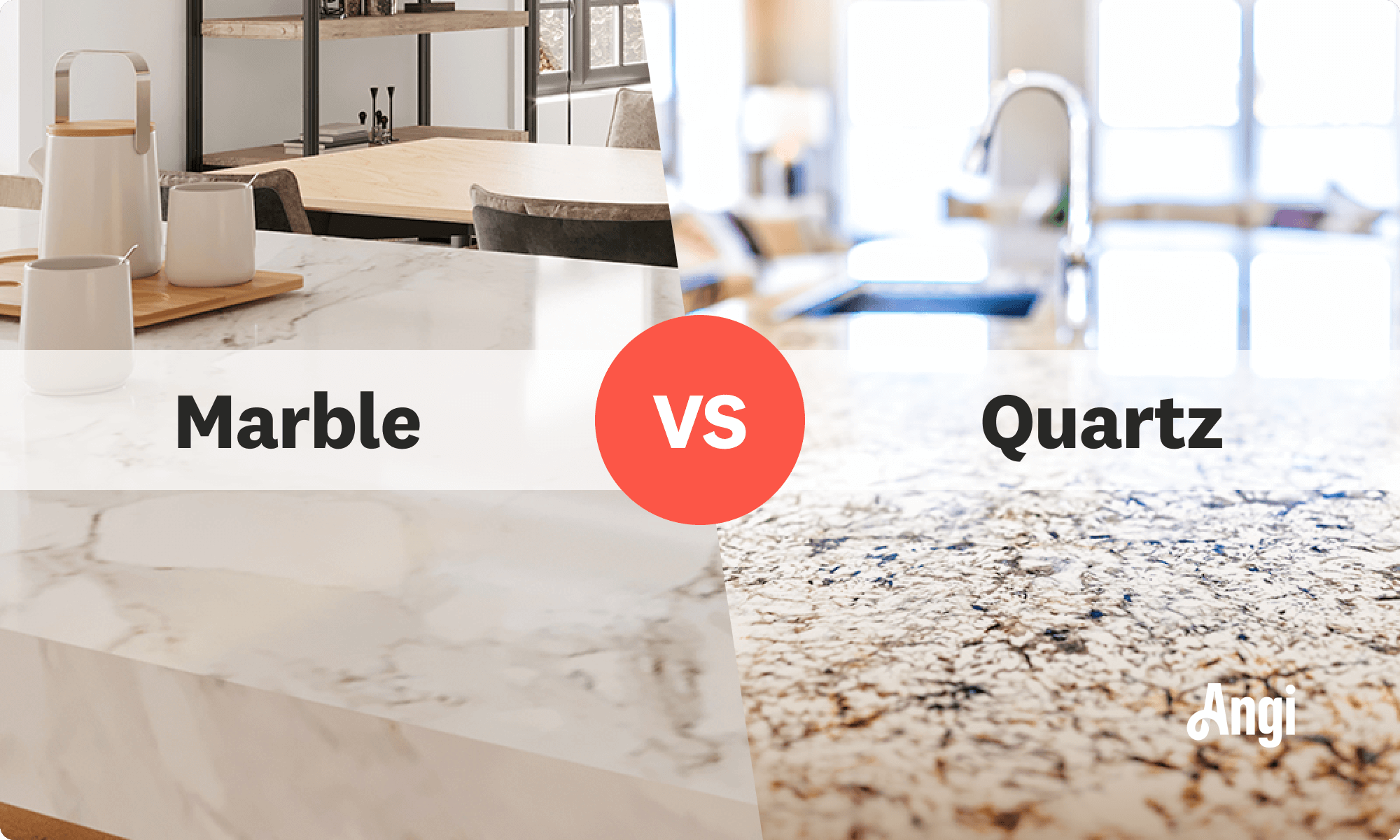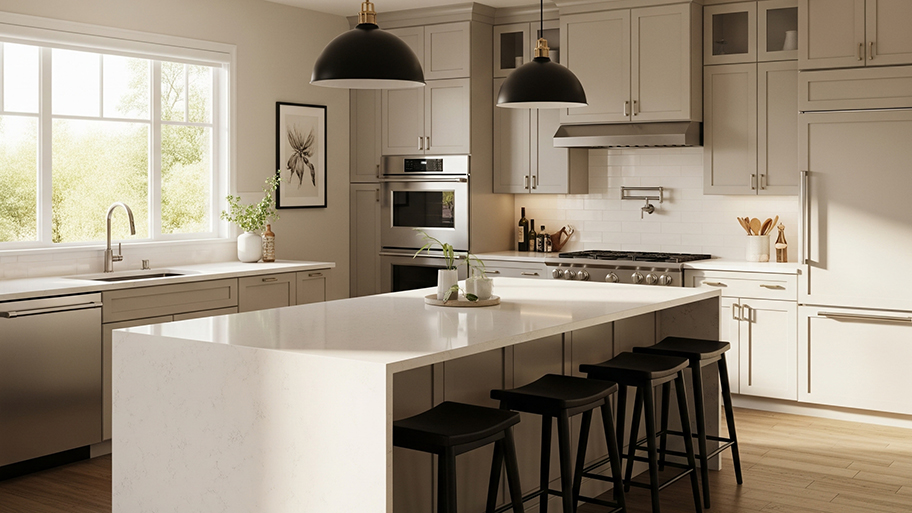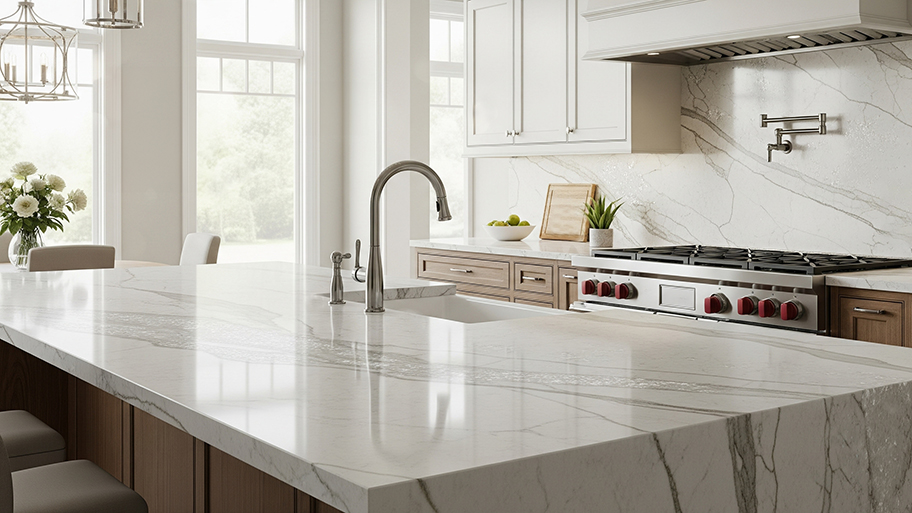
The cost of soapstone countertops varies primarily based on the size of the installation area, the color of the stone, and the type of edging.
The average cost to install marble countertops ranges from $2,000 to $5,000, with a national average of $3,000. The type of marble impacts cost the most.


Marble is a natural material that’s mined from quarries, so larger slabs and those with unique colors and vein patterns can cost many times more than small, standard slabs.
Marble is a graded material, with grade A representing the highest quality stone with no imperfections. Expect a higher cost for higher-quality marble.
Marble can discolor from UV exposure and absorb stains. For long-term budgeting, consider ongoing maintenance and sealing costs.
Most professionals include the cost of removing your old countertops in their estimates, but double-check and budget separately if yours doesn’t.
The marble countertops cost varies wildly, with the average landing around $3,000 for 50 square feet of counter space. However, prices can range from $2,000 to $5,000. As one of the most eye-catching and elegant countertop materials, marble can elevate the style of a kitchen, bathroom, or even a refurbished side table. While prices run higher than most materials, it's a relatively soft natural stone—meaning you can choose the right thickness, edge design, and finish for your home and budget.
From your first trip to the home renovation store to celebrating your newly installed marble countertops, what costs can you expect along the way? We've broken them down below.
Marble slab prices vary based on size. Typically, you’ll purchase countertops by the square foot, meaning the more marble that’s needed, the higher the cost. On average, expect to pay around $60 per square foot, though it can cost as little as $40 per square foot (for common, lower-grade marble) or more than $100 per square foot (for rarer or high-grade marble).
| Marble Slab Size in Feet | Average Cost |
|---|---|
| 8 x 4 | $1,920 |
| 8 x 6 | $2,880 |
| 10 x 4 | $2,400 |
| 10 x 6 | $3,600 |
Every slab of marble has its own unique markings—known as veins—often with flecks of gold, silver, and blue. You can find marble varieties that are manufactured in nearby factories and those imported right from the mountains of Italy.
In addition to cost differences, each of these unique natural or synthetic stones responds differently to stains, heat, and scratches, and often comes with its own cleaning instructions. Keep this in mind if you're debating between a great marble for the guest bathroom versus one for your favorite home baking spot. There's no surprise that the type, color, and origin of your marble all affect the cost of your countertops. Here are eight of the top favorites and their per-square-foot price tag.
Calacatta: $180 per square foot
Carrara: $40 per square foot
Cultured: $65 per square foot
Danby: $80 per square foot
Makrana: $12 per square foot
Pink: $25 per square foot
Statuario: $50 per square foot
Travertine: $75 per square foot
Marble is a natural material, so it’s rarely perfect when pulled right from the quarry. Each slab has different levels of quality—just like a diamond. The better the quality, the higher the price. Grading ranges from A (the highest quality) to D (the lowest quality). Here’s what to expect:
A: Near-perfect marble with appealing, subtle veining
B: Has minor flaws like pitting and fissures or a blotchy appearance
C: Has minor and major flaws, including chipping and large cracks that require repair
D: Has a significant amount of damage that needs repair, dark veining, and pronounced colors
Aside from the countertop itself, your contractor will need a few supplies for marble countertop installation. This includes items like caulk, screws, and bolts. Typically, extra supplies will only amount to $100 to $200 of the total cost of the job.
Slabs are heavy, so your contractor will likely need a crew of at least two people to manage your marble countertop installation. Expect to spend $35 to $45 per hour on labor. For the typical 10-hour job, labor will add $350 to $450 to your total bill—but these costs will rise in areas with a higher cost of living.

The cost of installing marble countertops isn’t as cut and dry as labor plus materials. There are some other costs that may occur before you start your project and others you might rack up once it’s complete. Consider the following.
You’ll need to remove and dispose of your old countertop before you can replace it with brand-new marble. This will add anywhere from $100 to $800 to the total cost of your project.
While you’re installing countertops, you may also want to install a matching marble backsplash or island. In this case, you’ll still pay by the square foot. The average marble backsplash costs between $900 and $3,500, but you can keep costs down by choosing tile instead of a slab. Islands vary by size, but most are at least 2 feet by 4 feet, so expect to spend $320 to $800.
There are a few different types of countertop edges to choose from. Some countertops come with a standard square or eased edge and others with a bullnose detail. If you want a non-standard or ornate edge treatment, it comes with an additional cost.
It depends on the manufacturer, but per linear foot, expect to spend:
$10–$12 for beveled, half-bullnose, and full-bullnose edging
$20–$25 for ogee, miter, Dupont, and quirk edging
$30–$40 for more ornate edging like French cove, double bevel, or Dupont square
If you purchase a lower-grade countertop, you may save upfront, but you’ll likely need repairs sooner than later. Unfortunately, alongside granite, marble is one of the most expensive countertop materials to fix. Expect marble countertop repairs to cost $200 to $1,200, though you can typically fix small chips and scratches with a $40 DIY marble repair kit.
Marble is a strong natural material, so it doesn’t need a ton of regular maintenance. Since it’s porous, you will have to seal it. Some countertops come pre-sealed, while others need yearly or quarterly sealing. The typical sealing treatment is around $100 to $200 and will help stave off water damage, etching (dullness from acidic liquids), and staining.
For the safety of both you and the marble itself, we recommend hiring an experienced countertop contractor in your area. A standard 30-square-foot slab can weigh around 200 pounds. Not only will the piece have sharp edges, but marble is quite soft, meaning it can chip or even break when dropped.
If you're installing a marble backsplash with small tiles, you may be able to purchase and complete the project on your own. Expect to pay between $7 to $10 per square foot of marble plus the cost of grouting and tools. But when it comes to traditional countertops, stick to the pro for safety and precision.
You can save anywhere from $320 to $800 by cutting out labor and installing countertops on your own. That being said, it’s not always worth it—nor is it always possible. To avoid damaging both your countertop and your back (we can’t state enough that marble slabs are ultra-heavy), leave it to a marble contractor in your area.
Let’s be real—marble isn’t the most affordable type of countertop. But it’s a high-end product, and you get what you pay for. If you have your heart set on marble’s delicate veining and laminate or synthetic stone just won’t do, there are still some ways you can save.
Choose tile instead of slab: You can purchase tile for as little as $7 per square foot. It’s easier to install.
Stick with makrana marble: At $12 per square foot, Makrana marble is well below the average cost of most marble. Plus, it’s naturally more durable because it isn’t as porous.
DIY the demolition: If you’re well-versed in home improvement projects, you can save some cash by prepping your space for countertop installation. This means safely removing your old countertop and disposing of it, which could reduce overall costs by $100 to $800.

Pros:
Durable
Elegant, timeless look
Unique patterns
Can increase home resale value
Scratch-, crack-, heat resistant
Stays cool to the touch
Cons:
Porous stone absorbs liquids
Susceptible to staining
Sealing and regular maintenance required
Softer than granite
Home is the most important place on earth, which is why Angi has helped more than 150 million homeowners transform their houses into homes they adore. To help homeowners with their next project, Angi provides readers with the most accurate cost data and upholds strict editorial standards. We extensively research project costs to develop the pricing data you see, so you can make the best decisions for you and your home. We rely on reputable sources, including the U.S. Bureau of Labor Statistics, academic journals, market studies, and interviews with industry experts—all to ensure our prices reflect real-world projects.
Want to help us improve our cost data? Send us a recent project quote to [email protected]. Quotes and personal information will not be shared publicly.
From average costs to expert advice, get all the answers you need to get your job done.

The cost of soapstone countertops varies primarily based on the size of the installation area, the color of the stone, and the type of edging.

New quartz countertops can give any kitchen a facelift. Find out quartz countertop costs, including quartz slab prices and the cost of installation.

How much your quartzite countertops will cost depends on a number of factors—most prominently, the type of quartzite and the size of your counters.

Granite countertops last 15 to 100 years based on usage and maintenance. Here’s how long your granite countertops will last and ways to increase their lifespan.

Are you weighing engineered stone vs. natural stone countertops? Both offer many of the same benefits, but there are differences in price, durability, and appearance.

If you’re preparing to install ceramic or porcelain tile, here are the tile questions you should be asking about the project.